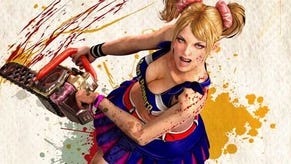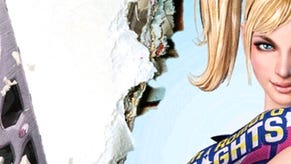Bat-s**t crazy: Lollipop Chainsaw goes zombie-mental
As Suda51 gears up to unleash multi-coloured hell, Stace Harman speaks to Scott Warr of Warner Bros. about the not-so-niche appeal of zombies and cheerleaders.
Grasshopper Manufacture CEO and creative luminary, Goichi Suda, has some very definite ideas about videogame style and narrative. What this has so far translated to is a body of work that has generally been critically well-received, but that carries with it a curious caveat; attempts to describe the nature and content of titles such as Killer7, No More Heroes and Shadows of the Damned usually involve one or more of the following adjectives: weird, bizarre, eclectic and/or bat-crap crazy.
It is unlikely a coincidence then, that the title with which the auteur game director intends to capture a wider audience than that of his previous output features a 21st century videogame zeitgeist: zombies. Paradoxically, zombies in videogames are most definitely not weird, bizarre, eclectic or bat-crap crazy.
“That [broadening the appeal] was Suda’s goal when he approached Warner Bros,” reveals Scott Warr, Warner Bros. producer. “He already had the Lollipop Chainsaw game mechanics and the character, so he was looking for help with the story. We paired Suda with James Gunn and they worked together to flesh out the storyboards and with James creating the narrative and writing the script.”
So far, so conventional, but between Suda’s creative vision and Gunn’s peculiar brand of humour – writing credits include the films Super (2010), Slither (2006) and Dawn of the Dead (2004) – there’s room enough for eccentricity to flourish; enter rock and roll themed zombie overlords, a profane disembodied head and an undead horde that explodes in a shower of blood and rainbows when hacked apart by the titular chainsaw.
Who’s that girl?
Of course, anyone that claims it was the zombies of Lollipop Chainsaw that first caught their eye in the game’s numerous trailers and promo videos is talking utter biscuits. No, that dubious honour undoubtedly falls to protagonist Juliet; a zombie-killer and cheerleader for the San Romero Knights. And if the former weren’t enough to make her popular with a large portion of videogame players, she can fall back on the latter – which is presumably intended both to typify her role as an 18-year-old high-school sweetheart and conveniently explain her gratuitously skimpy attire. Suda may be creative and Gunn might be funny, but neither is particularly subtle.
Introduced via an intimate, soft-focus bedroom sequence, Juliet is painted as an optimistic, exuberant teenager who happens to have turned 18 on the morning that we meet her and whose world revolves around high-school life, strawberry lollipops, her boyfriend Nick and slaying zombies. From the sequences shown-off by Warr, it seems that’s pretty much all there is to her but despite her overtly sexualised appearance, she exhibits very little in the way of knowingly sexual behaviour.
In one respect, this makes her less gratuitous than the likes of Bayonetta or Mass Effect’s Miranda, who are designed to flaunt their sexuality; though, of course, by casting Juliet in the wide-eyed, innocent school girl routine Grasshopper is catering to another clichéd form of titillation, deliberately or otherwise. Furthermore, Grasshopper’s insistence on providing upskirt shots as Juliet vaults obstacles and having the animated head of boyfriend Nick hanging behind her thus leading to her backside being framed just-so when he speaks during cut-scenes is wholly unnecessary and more than a little tiresome.
Warr himself does little to stand by these decisions, as Gunn or Suda might, as he explains almost defensively, “That’s where we work with the ratings boards; with ESRB, USK, PEGI and the like, to ensure that we’re staying within our boundaries.”
“Obviously, the marketing people have really gone with the whole blood, sex and Rock & Roll theme but it would be a shame for there to be snap judgements formed without people playing the game; that said, I know that’s going to happen because you just can’t avoid it. However, Suda really wanted this to be a US-style high-school, kind of a super school, and there was a lot of discussion between James and Suda about how that would work.
“As the user progresses they’re going to see that Juliet doesn’t swear all that much or flip up her skirt on purpose; in fact she only swears in the game twice, it’s those around her that do all the swearing.”
Over and over and over and over
As Warr’s play-through concludes, it’s neither the crassness of the script nor the casual sexualisation of the teenage protagonist that rankles most, but instead the worrying level of repetitiveness that’s exhibited throughout the different areas of the game. Despite playing with Juliet’s entire move-set unlocked for demo purposes, there are a handful of key moves that Warr employs again and again. Tactics appear to extend only as far as a few light attacks to shepherd stray zombies into a loose group before attempting to decapitate three or more at once to trigger the Sparkle Hunting reward system, from which the game’s currency is obtained.
Mini-games puncture the levels and provide some variety but as Warr shows sections from three separate areas of the game it’s difficult to ascertain whether the pacing will be judged sufficiently well to hold attention. The novelty of a bubbly, chainsaw-wielding zombie-slaying cheerleader will only take the game so far and it may be asking too much of the stylised violence to compensate for the apparent, restrictive linearity in both level design and character progression.
Lollipop Chainsaw could be a stylish and entertaining arcade-brawler with a smart mouth; certainly Michael Rosenbaum as the bemused Nick does a stand-up job of delivering Gunn’s script. But it could just as easily turn out to be wearing experience that lacks the substance to match its gregarious style. It would be a shame if its legacy is nothing but bluff and bluster concerning its pin-up protagonist because Suda is better than that. Let’s hope, then, that in attempting to appeal to a wider audience Suda and Grasshopper Manufacture are not betraying that which makes them unique; after all, everything is more interesting when you introduce a bit of weird.
Lollipop Chainsaw launches on PS3 and 360 on June 12 in the US and June 15 in Europe.











